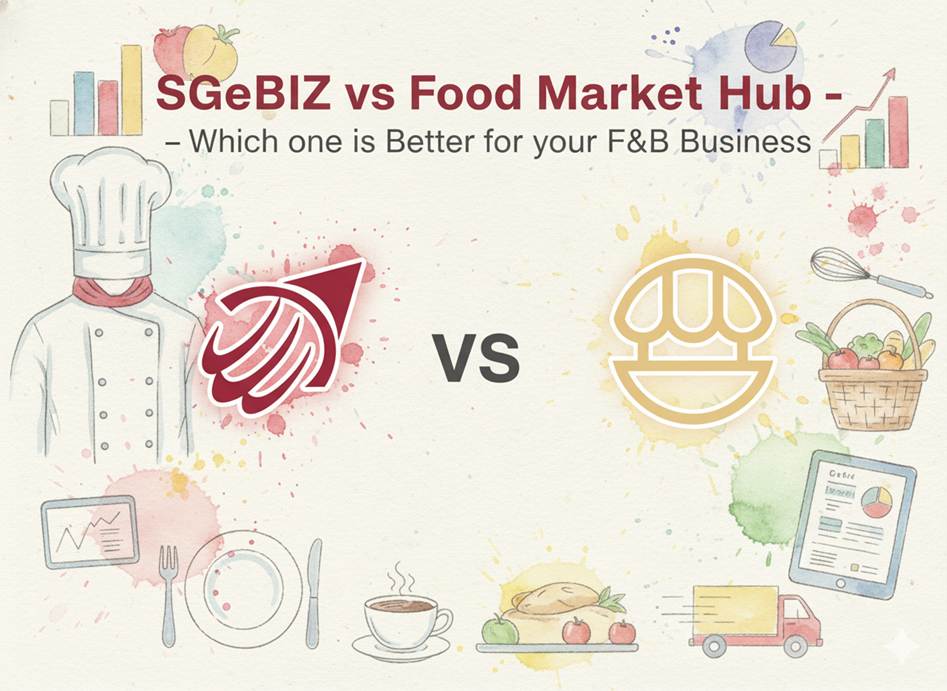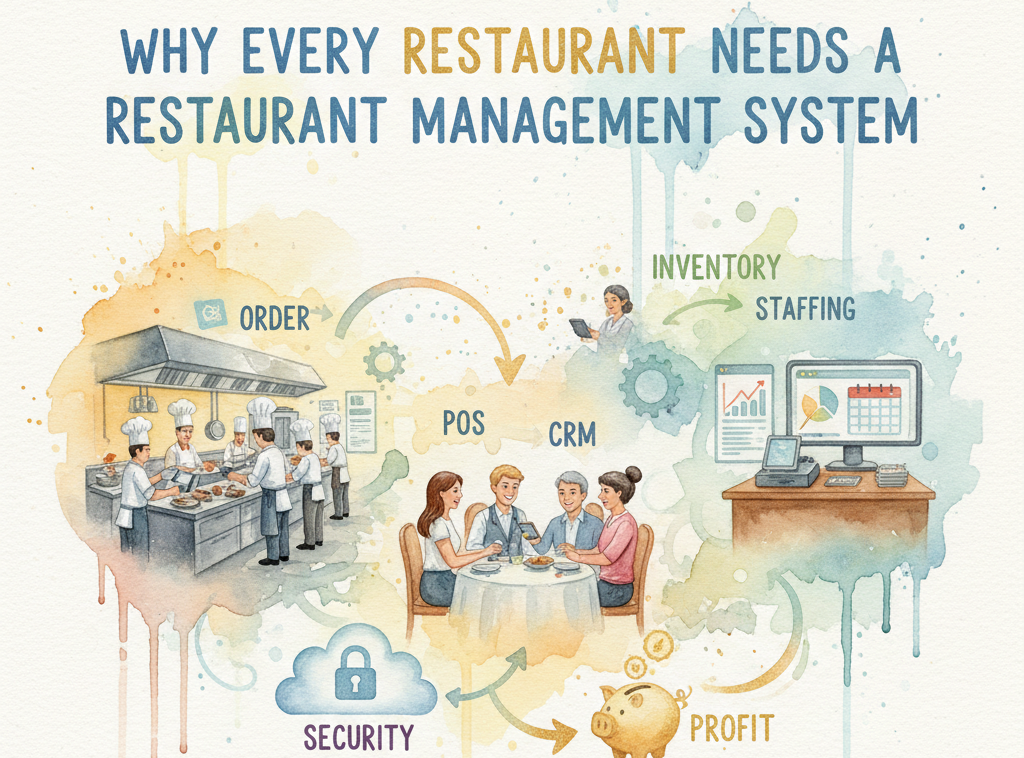Relevance of Artificial Intelligence in the Restaurant Industry

You work hard every day to make sure your customers enjoy great food and service. But managing a restaurant isn’t easy. You deal with staff schedules, food costs, customer orders, and so much more. What if there were a way to make things simpler and more efficient? That’s where artificial intelligence comes in.
Artificial intelligence, or AI, is no longer just a fancy tech term—it’s a tool that can help you save time, reduce waste, and improve how your restaurant operates. Whether it’s keeping track of inventory, predicting busy hours, or even helping in the kitchen, AI can make a real difference.
In this blog, we’ll explain what artificial intelligence is, how it can help in the back of the house, and why you should consider using it.
What Is Artificial Intelligence?
Artificial intelligence is a technology that allows machines to learn from data and make smart decisions. It’s like having a very smart assistant that can analyze patterns, predict trends, and even automate repetitive tasks. AI doesn’t replace humans—it helps them work better.
For example, AI can look at past sales data and predict how much food you’ll need for the weekend. It can also help reduce food waste by tracking what ingredients are used the most and which ones often go bad before being used.
Many industries already use AI to improve efficiency, and restaurants can benefit just as much.
Is AI Relevant for Restaurant Owners?
Artificial intelligence is relevant for today's restaurant operators. What was once considered futuristic technology is now an accessible tool that solves real challenges in the food service industry. AI isn't about replacing human staff - it's about enhancing their capabilities and making operations run smoother. From small cafes to busy dinner houses, these intelligent systems can be customized to fit establishments of any size.
Key Areas Where Restaurants Can Implement AI
Menu Development and Pricing
AI analyzes customer preferences, seasonal trends, and ingredient costs to help craft profitable menus. It can suggest which dishes to feature based on popularity and profit margins, recommend pricing adjustments, and even help create new recipes by identifying flavor combinations that appeal to your customer base. This data-driven approach takes the guesswork out of menu planning.
Inventory and Supply Chain Management
Smart inventory systems track stock levels in real-time, automatically generating purchase orders when supplies run low. More advanced AI can predict future ingredient needs based on factors like weather forecasts, local events, and historical sales patterns. This prevents both shortages and over-ordering, reducing food waste by up to 30% according to industry reports.
Customer Service Enhancement
AI-powered chatbots handle reservations and common customer inquiries, freeing up staff for more complex requests. Some systems analyze customer feedback across review platforms to identify areas needing improvement. Facial recognition technology in some establishments even allows for personalized greetings and service for regular patrons.
Kitchen Operations Optimization
AI monitors cooking equipment to maintain perfect temperatures and cooking times. It can alert chefs when food is nearing completion or if quality standards aren't being met. Some systems analyze ticket times and kitchen workflow to suggest more efficient preparation methods or station layouts.
Staff Management and Training
Intelligent scheduling systems account for predicted business levels, staff availability, and labor laws to create optimal shift plans. AI training programs can onboard new employees faster through interactive modules that adapt to individual learning speeds. Some systems even monitor staff performance to identify training opportunities.
How AI Helps in the Back of the House
The back of the house is where the real magic happens—but it's also where most of the stress comes from. Between tracking ingredients, managing staff, and keeping the kitchen running smoothly, there's always something that needs attention. This is where artificial intelligence technologies can make a real difference. AI doesn't replace your team—it helps them work smarter by taking over repetitive tasks and providing useful insights.

Smarter Inventory Management With AI
Trying to keep track of every ingredient manually is time-consuming and often leads to errors. You might overorder some items while running out of others at the worst possible time. AI changes this by monitoring your stock in real time. It tracks what you have, what’s running low, and even predicts when you’ll need to reorder.
For example, if your restaurant sells more chicken on weekends, AI will notice this pattern and suggest ordering extra before Friday. It can also alert you when certain items are being used faster than expected, helping you avoid last-minute shortages. According to the National Restaurant Association, poor inventory management leads to nearly 10% of food being wasted. With AI, you can reduce this waste and save money.
AI Prompt for Inventory Management:
"Analyze my last three months of ingredient usage and predict how much chicken, rice, and vegetables I’ll need for next weekend based on past sales trends."
Reducing Food Waste Through AI Insights
Food waste doesn’t just hurt your budget—it’s bad for the environment too. The Food and Agriculture Organization reports that about one-third of all food produced globally is wasted. AI helps by analyzing which menu items sell well and which ones don’t. If a dish isn’t popular, AI can suggest removing it or adjusting the recipe to reduce waste.
AI also tracks expiration dates and sends alerts when ingredients need to be used soon. Instead of throwing out spoiled food, you can plan specials or staff meals to use up what’s left. Over time, these small changes add up to big savings—potentially thousands of RM per year.
AI Prompt for Reducing Waste:
"Review my current menu and suggest which dishes have the highest waste rates. Recommend adjustments to portion sizes or ingredients to minimize waste."
Better Staff Scheduling With AI Predictions
Making staff schedules is a headache. You have to consider busy hours, employee availability, holidays, and unexpected call-outs. AI simplifies this by analyzing past sales and foot traffic to predict when you’ll need more staff. It can even account for factors like weather or local events that might bring in extra customers.
Instead of guessing, AI creates optimized schedules automatically. This means you’ll have enough people working during peak times without overstaffing on slow days. Your employees get fair shifts, and you avoid unnecessary labor costs.
AI Prompt for Staff Scheduling:
"Create a staff schedule for next week based on last month’s busiest hours. Make sure there are at least three servers during peak lunch and dinner times."

Improving Kitchen Efficiency With AI
A slow kitchen leads to long wait times and unhappy customers. AI helps by predicting order volumes so your kitchen can prep ingredients in advance. Some AI systems even suggest the best way to arrange workstations for faster cooking and plating.
For example, if AI notices that certain dishes take longer to prepare, it might recommend prepping some components ahead of time. It can also alert chefs when cooking times are running longer than usual, helping them adjust to keep service smooth. The result? Faster meals, happier customers, and less stress for your kitchen team.
AI Prompt for Kitchen Optimization:
"Analyze the average cooking time for my top five dishes and suggest ways to reduce prep time without sacrificing quality."
Why You Should Start Using AI Now
Many restaurant operators assume artificial intelligence is only for large chains with deep pockets. This couldn't be further from the truth. Today's AI solutions are designed with independent restaurants in mind, offering affordable ways to streamline operations and boost profits. The technology has reached a point where not using it might actually put you at a disadvantage.
AI Saves You Significant Money
Every ringgit counts in the food business, and artificial intelligence helps protect your margins in multiple ways. By analyzing your sales patterns and inventory usage, AI can pinpoint exactly where you're losing money. It might reveal that you're consistently over-ordering certain perishable items that often go bad before use. Or it could show that particular menu items have hidden costs due to excessive prep time or waste.
The financial benefits extend beyond just food costs. AI-powered energy management systems can optimize equipment usage to reduce utility bills. Smart scheduling tools ensure you're never overstaffed during slow periods. These small savings add up quickly - many restaurants see a full return on their AI investment within the first six months of use.
AI Gives You Back Precious Time
Between managing staff, dealing with suppliers, and overseeing daily operations, your time gets stretched thin. Artificial intelligence takes over many of these routine tasks automatically. Imagine not having to manually count inventory every week because your system tracks it in real-time. Picture not spending hours creating schedules when AI can generate optimized rosters in minutes.
This reclaimed time lets you focus on what matters - creating memorable dining experiences, training your team, or even taking a well-deserved break. The mental load of running a restaurant becomes lighter when AI handles the repetitive calculations and administrative work.
AI Enhances the Customer Experience
Today's diners expect fast, seamless service, and AI helps you deliver. In the kitchen, AI-powered equipment can maintain perfect cooking temperatures and times consistently. Out front, AI analytics help you understand customer preferences so you can tailor your menu and service. Some systems can even predict busy periods so you're perfectly staffed when the rush hits.
The result? Happier customers who receive their food faster and exactly how they like it. These satisfied guests become regulars who spend more and recommend your restaurant to others. In an industry where customer loyalty is everything, AI gives you an edge in building lasting relationships.

AI Makes Operations Smoother for Everyone
Your staff will appreciate how artificial intelligence removes frustration from their workday. Cooks won't have to rush because the system warned them about an incoming large party. Servers won't have to deal with angry customers when the kitchen runs out of popular items, because AI prevented that shortage. Managers spend less time putting out fires and more time leading.
This improved work environment reduces turnover and makes your restaurant a better place for both employees and customers. When your team isn't bogged down by preventable problems, they can focus on delivering great service and food.
Frequently Asked Questions
1.How much does AI cost for a restaurant?
The cost depends on the type of AI tools you choose. Some basic inventory management systems start at around RM 200 per month, while more advanced solutions may cost more. However, the savings from reduced waste and better efficiency often make up for the cost.
2.Is AI difficult to set up in a restaurant?
Most AI tools are designed to be user-friendly. Many providers offer setup support, so you don’t need to be a tech expert to use them.
3.Can AI replace human workers?
No, AI is meant to assist, not replace. It handles repetitive tasks so your staff can focus on providing great service.
4.What’s the best way to start using AI in my restaurant?
Start with one area, like inventory management or staff scheduling. Once you see the benefits, you can explore other AI solutions.
5.Will AI make a difference in my restaurant?
Yes. Many restaurants using AI report lower costs, less waste, and happier customers. It’s a smart investment for long-term success.
Artificial intelligence isn’t just a trend—it’s a practical tool that can help you run a smoother, more profitable restaurant. From managing inventory to reducing waste and improving kitchen efficiency, AI offers real solutions to everyday challenges.
If you’re ready to make your work easier and your restaurant more efficient, it’s time to explore what AI can do for you. Start small, see the results, and take your restaurant to the next level with the power of artificial intelligence.










